Twitter is a crowded platform. As of the end of 2020 the platform had 192 million monetizable daily active users (mDAUs).
In order to increase reach and engagement among your users, you need to understand how they use social media, what their needs are and how they're communicating with one another. Use these handy tools to identify Twitter hashtags that are relevant to both your business and your audience.
That’s a huge pool of users. But with all of the politicians, businesses, and celebrities vying for individuals’ attention, it can be difficult to have your tweets seen, much less get any engagement. Twitter hashtags are the key to doing both of these things.
The small but mighty Twitter hashtag (#) helps organizations connect with consumers by grouping subjects and trends in an easily searchable way. When you use them as a marketer, it helps you better reach individuals who are interested in these topics. Better yet, you can launch Twitter hashtag campaigns at no cost, giving you the opportunity to achieve incredible ROI. This blog covers eight Twitter hashtag research tools you can use to make your next campaign successful.
Types of Hashtags
Before we look at research tools, let’s quickly cover the different types of hashtags you may want to include in your campaign.
There are four general types of hashtags: lifestyle-based (#winter, #fashion, etc.), event-based (#sale, #ModCloth, etc.), brand-based (#HaveaSnickers, #ShareaCoke), and product-based (#LBD, #ColeHaan, etc.).
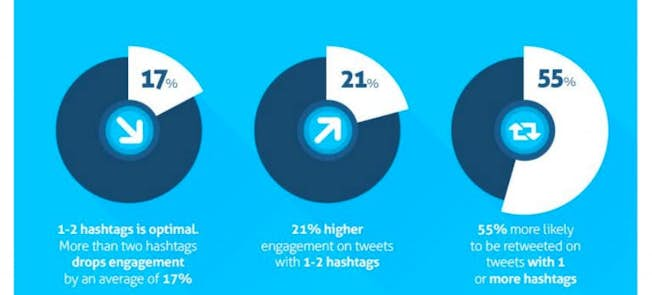
Creating your own hashtag can help your content go viral, but it’s a difficult thing to get going if you don’t have a huge amount of advertising budget. That’s where hashtag research comes in. With research, you can see which hashtags are trending so that you can play off of them.
Twitter Hashtag Research Tools
By researching the hashtags that are popular with your buyer personas, you can better target users who are a part of your ideal audience. However, there are many tools available to help you do this. Each has its benefits and its issues, but generally speaking, you’ll want to look for tools that can help you: discover demographics, monitor hashtags, improve influencer outreach, understand sentiment, and locate geographic data.
(This article originally listed ExportTweet, which no longer appears to be available.)
1. Twitter
Perhaps the most obvious place to look for hashtag trends is Twitter itself, though sometimes marketers forget this fact. Along with having the most accurate and up-to-date information, it’s also super convenient. Find hashtags on the left side of your Twitter screen, or use the search bar to find more insights.
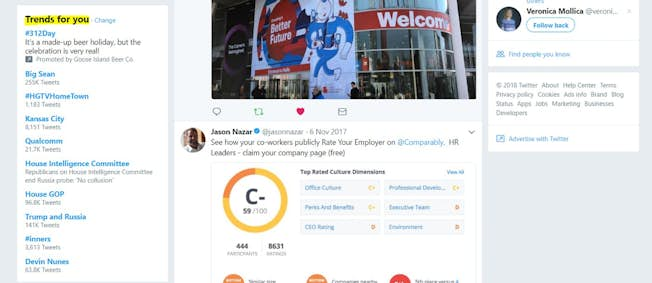
By tapping into current hashtag trends, you may be able to capitalize on them and get more exposure for your tweets. And with the Twitter word count expanded to 280 characters, it could be easier to make a connection between a trending tag and your brand.
2. RiteTag
RightTag is great for finding and tracking current hashtags, while also helping you discover the best-related hashtags for images and text. And with the site’s helpful Chrome extension, you can highlight text, or get instant hashtag suggestions when you right-click images.
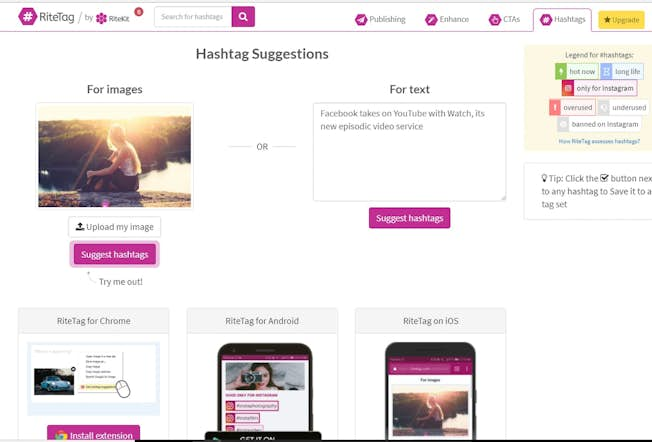
Pricing for the tool is $49 annually for up to 1,000 image and text queries each month, with other, more advanced plans also available, including publishing and writing features.
This free search tool (also available in a paid version) provides real-time data from the day of your search with the number of impressions and tweets for the day. See the #contentmarketing hashtag result as an exam.
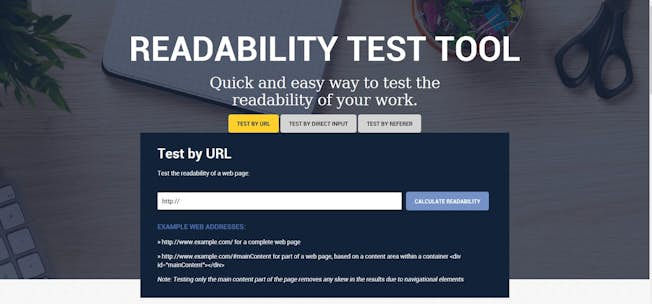
The free reports show the top URLs associated with the hashtag, languages used, top associated words, user mentions, an influencer index, and associated hashtags.
4. Hashtagify
If you’re just starting out with hashtag research, Hashtagify is a great resource. Visual and simple to understand, it helps you find relevant hashtags, as well as information about a hashtag’s popularity over time, data on influencers, and information about geographic areas and languages used. Both free and paid versions are available.
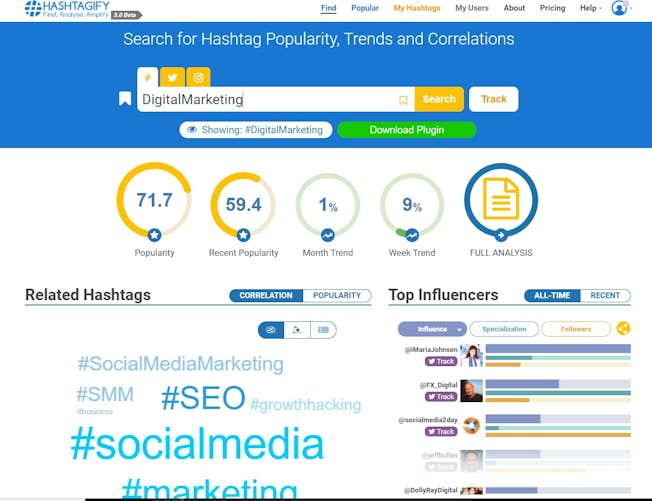
The paid version of the tool starts at $9 per month and adds two months of data storage, hashtag trackers, a bookmark feature, and full access to top hashtags.
5. Keyhole
Keyhole offers a free search function that’s using for gathering general information. You can get real-time data such as users, number of posts, demographics, impressions, reach, top sources, and sentiment. Here’s an example using the hashtag #marketing:
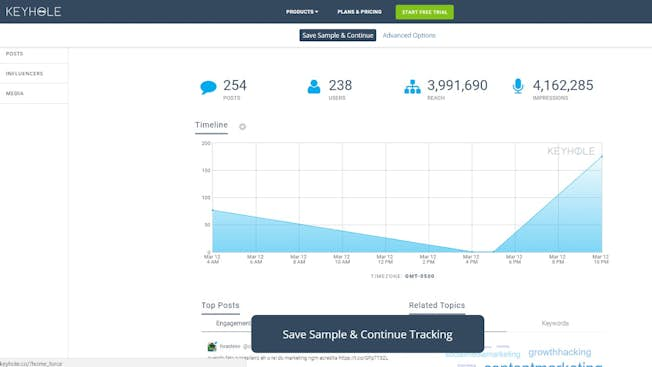
6. Trendsmap
Local businesses can use Trendsmap to find hashtags in their specific area--great if you have a company that thrives from local traffic (like events, etc.). The tools shows the most popular trending topics based on geography. Though you can see this information on Twitter, you won’t get the same amount of topics you’ll see using this tool. With Trendsmap, you get local trending words, users, and hashtags. Click zoom on the interactive map to find what you’re looking for with the free version. With the paid plan, you can narrow your search to specific cities and other locations and customize the type of data you see. Here’s an example from southern Florida using the free version:
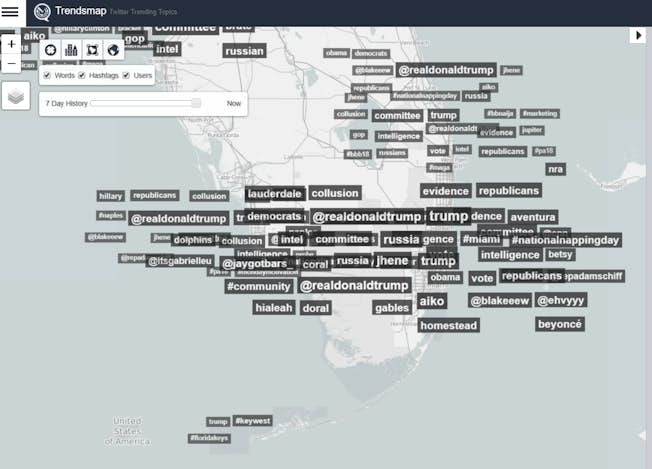
Trendsmap has free and paid options that start at $25 per month. The free version offers real-time data only, while paid plans also show historical data.
7. SocialAlert
This budget-friendly tool is perfect for small businesses or individual users. Try a free search, then upgrade to the paid plan if you so choose. The free search will allow you to see and analyze 300 tweets over a 7-day period, including impression rate, hashtag reach, sentiment, and geographic data. The paid version offers added historical data, in-depth analytics, influencer tracking, and more and starts at just under $10 per month for two campaigns. You can then upgrade your plan as required.
8. DrumUp
This is a general curator tool that also includes popular hashtags for your posts.
Conclusion
Hashtags are absolutely necessary for successful Twitter marketing. Use these resources to get a head start and try each to determine which types of resource tools work best for your business. Trying the free versions and trials will help you figure out what you want to invest in and how much.
Become a specialist in Twitter and other key social media platforms with the DMI social media marketing course.
(Published March 2018, updated March 2021)
- Categories:
- Articles
- Social Media Marketing
Upgrade to Power Membership to continue
your access to thousands of articles, toolkits, podcasts, lessons and much much more.
Become a Power Member- Login
- View Courses
- - - -
- Courses
- Resources
- - - -
- My Account
- Change Password
- Logout




